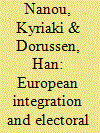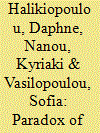| Srl | Item |
| 1 |
ID:
120132


|
|
|
|
|
| Publication |
2013.
|
| Summary/Abstract |
The assignment of policy competencies to the European Union has reduced the divergence of party policy positions nationally, leaving the electorate with fewer policy options. Building upon insights from spatial proximity theories of party competition, the convergence argument predicts convergence particularly in policy domains with increasing EU competence. As the policy commitments that derive from EU membership increase, parties become more constrained in terms of the feasible policy alternative they can implement when in office. The analysis uses manifesto data at the country-party system level for nine policy domains. It uses ordinary least squares (OLS) estimation with country fixed effects, a lagged dependent variable and country corrected standard errors. Controlling for other factors that could plausibly explain policy convergence, the models also assess whether the convergent effect of party positions varies across different types of parties. The main finding is that in policy domains where the involvement of the EU has increased, the distance between parties' positions tends to decrease. The constraining impact of EU policy decisions differs between Member and non-Member States. This effect is more apparent for the policy agendas of larger, mainstream and pro-EU parties in the Member States.
|
|
|
|
|
|
|
|
|
|
|
|
|
|
|
|
| 2 |
ID:
113139


|
|
|
|
|
| Publication |
2012.
|
| Summary/Abstract |
What can explain the strong euroscepticism of radical parties of both the right and the left? This article argues that the answer lies in the paradoxical role of nationalism as a central element in both party families, motivating opposition towards European integration. Conventionally, the link between nationalism and euroscepticism is understood solely as a prerogative of radical right-wing parties, whereas radical left-wing euroscepticism is associated with opposition to the neoliberal character of the European Union. This article contests this view. It argues that nationalism cuts across party lines and constitutes the common denominator of both radical right-wing and radical left-wing euroscepticism. It adopts a mixed-methods approach, combining intensive case study analysis with quantitative analysis of party manifestos. First, it traces the link between nationalism and euroscepticism in Greece and France in order to demonstrate the internal validity of the argument. It then undertakes a cross-country statistical estimation to assess the external validity of the argument and its generalisability across Europe.
|
|
|
|
|
|
|
|
|
|
|
|
|
|
|
|